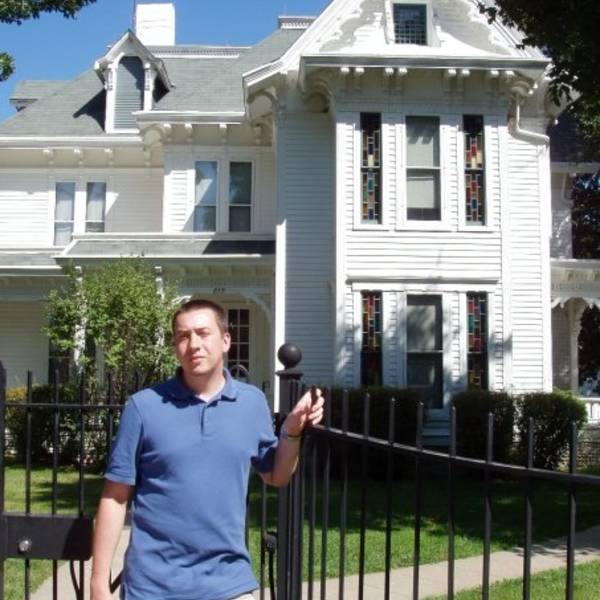Q: What famed 19th century poet was inspired to serve as a nurse during the Civil War after spending time at Chatham Manor at what is now the Fredericksburg and Spotsylvania National Military Park?
A: Leaves of Grass author Walt Whitman (1819-1892) arrived at Chatham Manor, a makeshift Civil War hospital, in December of 1862. He was in search of his brother George, a lieutenant in the Union Army who had been wounded at the Battle of Fredericksburg on December 13. He located his brother with only a superficial wound to his cheek, and soon discovered a second calling at Chatham Manor to which he would dedicate much of his time over the next three years.
“Spent a good part of the day in a large brick mansion on the banks of the Rappahannock, immediately opposite Fredericksburg. It is used as a hospital since the battle, and seems to have received only the worst cases. Outdoors, at the foot of a tree, within ten yards of the front of the house, I noticed a heap of amputated feet, legs, arms, hands, etc. – about a load for a one-horse cart. Several dead bodies lie near, each covered with its brown woolen blanket. In the dooryard, toward the river, are fresh graves, mostly of officers, their names on pieces of barrel staves or broken board, stuck in the dirt.”
–The Wound Dresser by Walt Whitman
Once assured that his brother was safe, Whitman pitched in at the impromptu medical installation, at first helping the wounded to write letters home and talking with those who needed company. In the few weeks he spent at Chatham Manor, Whitman’s nursing skills improved as he worked alongside notable medical pioneers like Clara Barton (1821-1912) and Dr. Mary Edwards Walker (1831-1919). Once the medical staff at Chatham Manor needed less help, Whitman headed for Washington, D.C., where he would spend the next three years volunteering in different hospitals. There, he “went among from 80,000 to 100,000 of the wounded and sick, as a sustainer of spirit and body in some degree, in time of need.“
Chatham Manor, which early American statesman William Fitzhugh (1741-1809) built in 1771, had been at the center of strife long before Whitman arrived in Fredericksburg, Virginia. The Georgian-style southern plantation encompassed more than 1,200 acres and relied on slave labor, with between 60 and 90 enslaved people working on the estate at any one time. In 1805, several enslaved people started a minor rebellion by overpowering and whipping their overseer and four others on the plantation. The rebellion ended with a posse of white men capturing and executing one of the enslaved people, while two others were killed trying to escape. Another two were sold off to the Caribbean, which was seen at the time as a virtual death sentence. Slavery would remain at Chatham Manor until the Civil War.
Fitzhugh sold Chatham Manor to Continental Army Major Churchill Jones in 1806, long before Virginia seceded from the Union in 1861. In 1857, Jones’ niece Betty Churchill Jones Lacy and her husband James Horace Lacy purchased the property. Following Virginia’s entry into the war, southern sympathizer James Lacy left his family to join the Confederate Army, leaving his wife and children to manage the estate until the Union Army arrived in the spring of 1862. Union troops forced Betty Lacy and her children to relocate to the battered city of Fredericksburg for the duration of the war.
For the first several months after occupying Chatham Manor, the Union Army used the estate as a headquarters, and President Abraham Lincoln even visited. Then, seeking an opportunity to march forward into the Confederate capitol of Richmond, the Union Army amassed its troops in the area and engaged with the Confederate Army during the Battle of Fredericksburg from December 11 to 15, 1862. Considered one of the most lopsided losses of the Civil War, the Union was severely beaten, resulting in more than 12,000 casualties. The approximately 9,600 wounded among those casualties transformed Chatham Manor into the overflowing hospital where Walt Whitman would arrive just a few days later.
No other local event of the Civil War had as much impact on Chatham Manor as that battle, though the Union Army remained in possession of the estate until the end of the war. When the Lacy family finally returned in 1866, they found it in near-ruins. They remained in their home, unable to return it to its former glory, until they sold it in 1872. After a series of owners, Daniel and Helen Devore restored the estate in the 1920s to its original 1771 appearance. In 1975, the last private owner of Chatham Manor, John Lee Pratt, willed the mansion and 30 surrounding acres to the National Park Service, which incorporated it into the existing Fredericksburg and Spotsylvania National Military Park, helping to preserve the site and making it open to the public to this day.
Stay On Top of News
Our email newsletter shares the latest on parks.
Whitman’s experience during the Civil War, including his time at Chatham and other Civil War hospitals, had a profound impact on him and inspired numerous poems, largely based on personal notes he had made during his time as a nurse. Many of these were published in his 1865 collection Drum-Taps.
